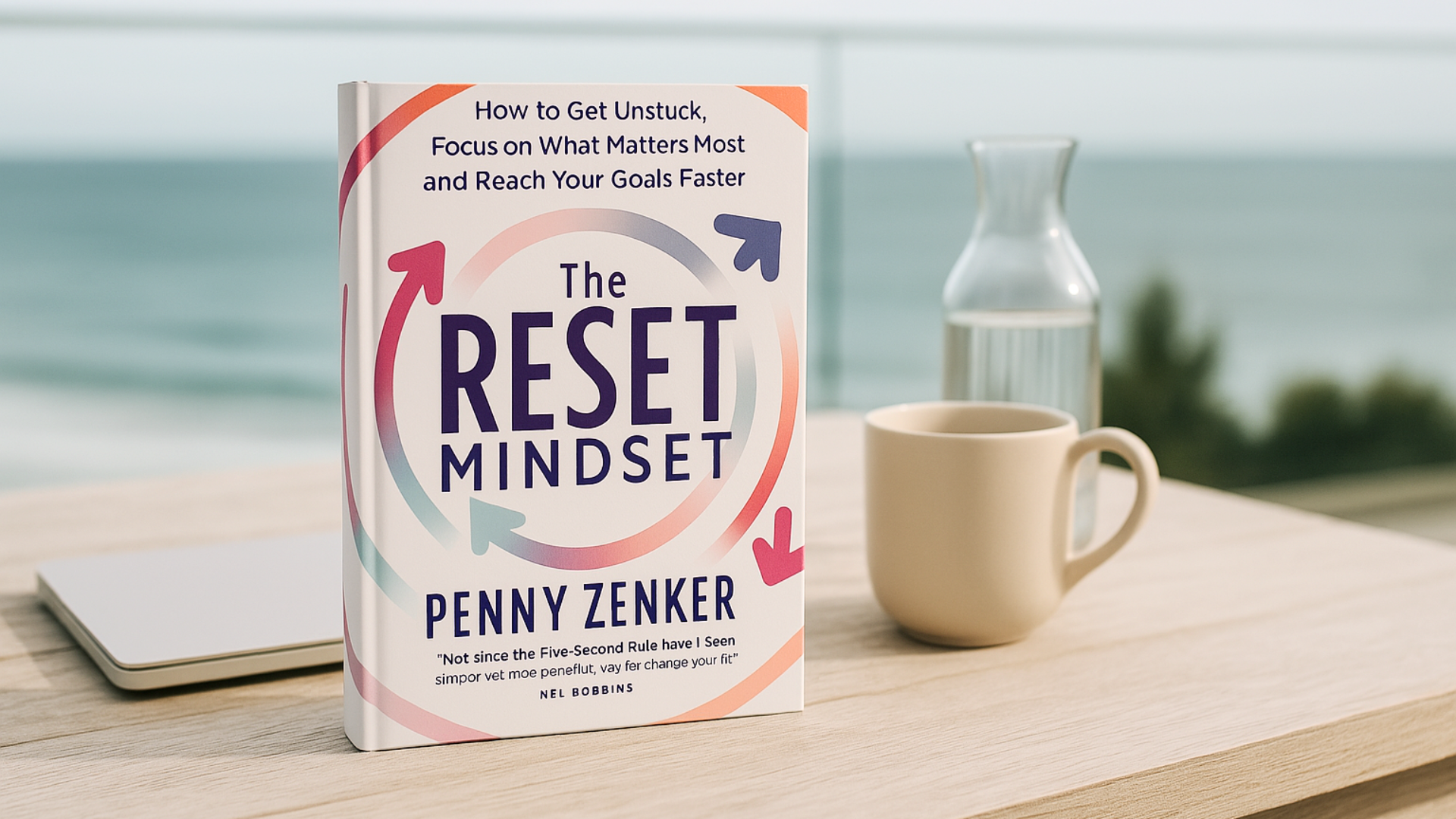Tools for Burnout Recovery and Mental Reboot

Book Review: The Reset Mindset by Penny Zenker
A practical and compassionate guide to reclaiming focus, build resilience, and lead with clarity
In The Reset Mindset, Penny Zenker delivers a timely and thoughtful guide for anyone feeling overwhelmed, scattered, or stuck. Blending personal stories with practical tools, Zenker introduces a structured yet flexible approach to change and resilience. Her concept of “Reset Moments” offers more than productivity advice. It presents a philosophy of intentional living and leading that is grounded in awareness, curiosity, and conscious choice.
At its core, the book is about reclaiming agency. In a world full of noise and distraction, Zenker reminds us that we always have a choice about how we respond. Her message is equal parts encouragement and accountability.
What the book promises
Zenker promises to help readers get unstuck, focus on what matters most, and reach their goals faster. She does this through the framework of the Reset Mindset, a practice built around taking purposeful pauses to rethink, realign, and take action with intention. Rather than reacting to stress, distractions, or uncertainty, the Reset Mindset teaches us to step back, assess what’s working, and move forward with clarity.
This is not a book about pushing harder or adding more to your to-do list. It is about simplifying, resetting your focus, and making aligned decisions. The promise is one of empowerment through perspective, with a strong emphasis on both personal leadership and organizational effectiveness.
What the book delivers
Zenker delivers on her promise through a clear, repeatable framework rooted in her three-step Reset Practice: Step Back, Get Perspective, Realign. These steps are simple by design, allowing readers to apply them in both personal and professional contexts. Whether managing team dynamics or navigating a difficult personal moment, the Reset Practice helps anchor attention and decision-making.
Each chapter offers practical reflections and exercises. Zenker moves fluidly between business insights and personal storytelling, including vivid anecdotes about grief, parenting, burnout, and breakthrough. Her story about skydiving, for instance, serves as a metaphor for choosing presence over panic. These lived experiences give the book emotional resonance, and help ground its strategic advice in real life.
The book also contrasts the Reset Mindset with other approaches, including the Growth Mindset. Zenker distinguishes her framework by highlighting its focus on dynamic reassessment, not just persistence. She argues that while growth helps us improve, reset helps us redirect. This distinction is especially useful for readers navigating change, uncertainty, or leadership roles.
Style and structure
Zenker writes in a grounded, conversational tone. Her voice is confident and encouraging, with a rhythm that feels well-paced and intentional. She balances coaching language with empathy, making the reader feel seen rather than instructed.
The book is organized into digestible chapters with clear headings and callouts. Each section builds on the last, but the structure also allows for flexibility. Readers can return to key tools or ideas without needing to reread entire chapters. This makes the book especially useful as an ongoing resource rather than a one-time read.
Zenker also makes effective use of summaries and questions for reflection. These elements help reinforce learning and prompt meaningful application. Readers are invited to pause, assess, and respond—mirroring the book’s core philosophy.
Where the book shines
The concept of the Reset Moment is the heart of the book and where Zenker shines brightest. She defines these moments as intentional pauses to reconnect with values and choose next steps with clarity. This idea feels both innovative and deeply intuitive. It is simple enough to apply daily and substantial enough to shift long-term patterns.
Zenker is also skilled at making emotional intelligence practical. Her chapter on conflict, for example, offers actionable tools for staying grounded in emotionally charged situations. She shares relatable examples, like parenting meltdowns or workplace tension, and shows how the Reset Mindset creates space for better choices.
Another strength is the book’s adaptability. While it is geared toward professionals and leaders, the principles are equally useful for anyone navigating personal growth, burnout, or transitions. Zenker’s blend of business and personal insight makes the book accessible to a wide range of readers.
Light limitations
The tone of the book is consistently positive and forward-looking, which supports its coaching purpose. At times, though, readers seeking deeper exploration of systemic or contextual challenges may find the lens a bit narrow. For instance, the book focuses on individual choice and agency without much discussion of structural barriers or collective pressures.
Some readers may also wish for more depth in the early chapters. The foundational concepts are introduced quickly, and those unfamiliar with mindset work might benefit from additional grounding before moving into application. However, the simplicity of the framework is also its strength, making it easy to begin using right away.
Finally, readers who are not in leadership or business roles may need to translate some of the examples into more personal or relational contexts. Zenker clearly writes with organizational impact in mind, but the underlying tools remain useful across domains.
Final thoughts
The Reset Mindset is a powerful and practical companion for anyone seeking to live and lead with more focus and intention. Penny Zenker brings clarity, compassion, and structure to the often messy work of change. Her Reset Practice is simple enough to apply immediately and deep enough to shape habits over time.
This book will especially resonate with those who are tired of hustle culture but still want to create meaningful results. It is not about doing more. It is about doing what matters, with presence and purpose.
Highly recommended for leaders, coaches, facilitators, and busy professionals who want to build resilience and regain clarity in a fast-moving world.